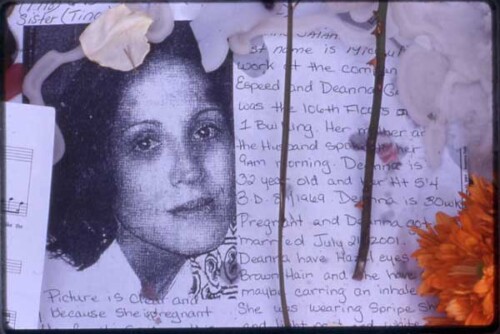Hosted in 1984, the eleventh Scholar & Feminist Conference – Women in Resistance – examined how women were confronting and countering oppressive power structures on a number of fronts, from South African apartheid and Italian militancy to domestic abuse and degrading representations of women in popular culture. Temma Kaplan, former BCRW director who organized that historic gathering, leads a conversation with scholars and activists committed to continuing the struggle toward a more just and peaceful world. Participants included:
- Jennifer Kern, disability rights activist
- Minnie Bruce Pratt, poet and activist
- Barbara Ransby, Associate Professor of History and African-American Studies, University of Illinois, Chicago
- Kumkum Sangari, Professor of English, University of Wisconsin at Milwaukee
- Heisoo Shin, UN Committee on the Elimation of Discrimination Against Women
- Lateefah Simon, former Executive Director, Center for Young Women’s Development
Kumkum Sangari started off the discussion by insisting that any women’s movement must, in order to progress, honestly account for its successes and its failures. Concentrating on her own experiences in Indian women’s movements, she outlined “five or six major mobilizing points” around which women in India have organized since the late 1970s, from struggling out from under the shadow of British colonization to confronting the “high incidence of [the] rape of poor women, custodial rape, dowry debt, widow immolation” and other forms of violence aimed at women. Although much progress has been made on these fronts, Professor Sangari pointed out the limitations of media-based activism that makes an “easy correlation made between exposure and social transformation”: journalism is not the surest route to social change and, as it is currently practiced, rarely leads to the kind of coalitional politics that are necessary for sweeping and sustainable reform.
Jennifer Kern and Lateefah Simon echoed the need for women’s movements that are bold and creative enough to span divides and connect to issues that, at first glance, may not seem central to women’s concerns. Jennifer Kern reminded us of the limits of any single-issue platform, saying that “none of the [feminist] advances [thusfar] is a panacea against poverty, lack of adequate health care, education, access to jobs, political power.” And both she and Lateefah Simon spoke of the importance of including the vision and addressing the needs of women who, for one reason or another, have been rendered invisible to the mainstream (predominately white, predominantly middle-class) women’s movement. Drawing on her experiences at San Francisco’s Center for Young Women’s Development, Lateefah described being at the center of an organization that is led by the very women it is intended to help. By working side-by-side with young, poor, incarcerated women, she has witnessed first-hand the revolutionary possibilities that come when those who live on the fringes of society are provided with the skills and the power and the “opportunities to lead their own movement.”
Minnie Bruce Pratt continued this honest accounting of the limitations and blind-spots in the women’s movement by revisiting an essay she contributed to Ellie Bulkin’s Years in Struggle: Feminist Perspectives on Anti-Seminitism and Racism. Her conclusion, she admitted, was flawed by a failure to critique capitalism in America and its consequences around the globe. The difficulties of doing so was, of course, “born of the fact that the U.S. had gone through the McCarthy Era, in which [such critiques] had been completely suppressed through deliberate government policies.” Today, as we face down a presidential administration with a frighteningly similar agenda, we must be careful not to let the government co-opt the hard-won victories of social justice movements, to use, for instance, “the slogan of the liberation of women [as it has done in Afghanistan] to pursue its wars of aggression.” Perhaps the most direct call to action came from CEDAW member Heisoo Shin who, building on Minne Bruce’s vision of a movement capable of countering U.S. imperialism, maintained that “the greatest challenge [to Americans and American women] is to change your government.” To fail to do so, she warned, with sobering insight into the United States refusal to sign onto a number of UN treaties, would have dire consequences for women around the world.
Historian Barbara Ransby agreed that the current realities of progressive Americans seem bleak, but she paved a promising route toward better days. We must, she argued, cling not only to an accurate accounting of history and its lessons, but also to our imaginations, which allow us “to dream, not about just what is, but what can be.” A vision of the future, of the future that we want to fight for, oftentimes proves a greater source of strength and mobilization than the sight of obstacles we can agree to fight against. Together, the six panelists offered an uncompromising assessment of feminisms past failures and current limitations in the hopes of delineating a movement with the direction and staying power of carrying us all into a more just future. Undoubtedly, it will be a long and exhausting road, but in the end, it is always the travelers who determine the destination. “We,” as Lateefah Simon says, “are the one’s we’ve been waiting for.”
Text: Full Transcript (PDF, 184 KB)
Video Clips: Play Clip 1
Kumkum Sangari outlines the successes and failures of the women’s movement in India Play Clip 2
Jennifer Kern discusses how coalitional politics has nurtured the growth of the international disability rights movement Play Clip 3
Lateefah Simon shares the “revolutionary ideology” of recruiting young, poor, at-risk women-of-color into actively participating in movements for social change Play Clip 4
Historian Barbara Ransby explores the importance of understanding the past in order to forge a vision for a more just future Play Clip 5
Heisoo Shin challenges Americas, and American women in particular, to change their government for the betterment of humans around the world Play Clip 6
In response to an audience member’s question, Minnie Bruce Pratt takes up the issue of building an anti-imperialist feminist movement Play Clip 7
Moderator Temma Kaplan closes the panel with a call to keep informed, to organize and to demonstrate



